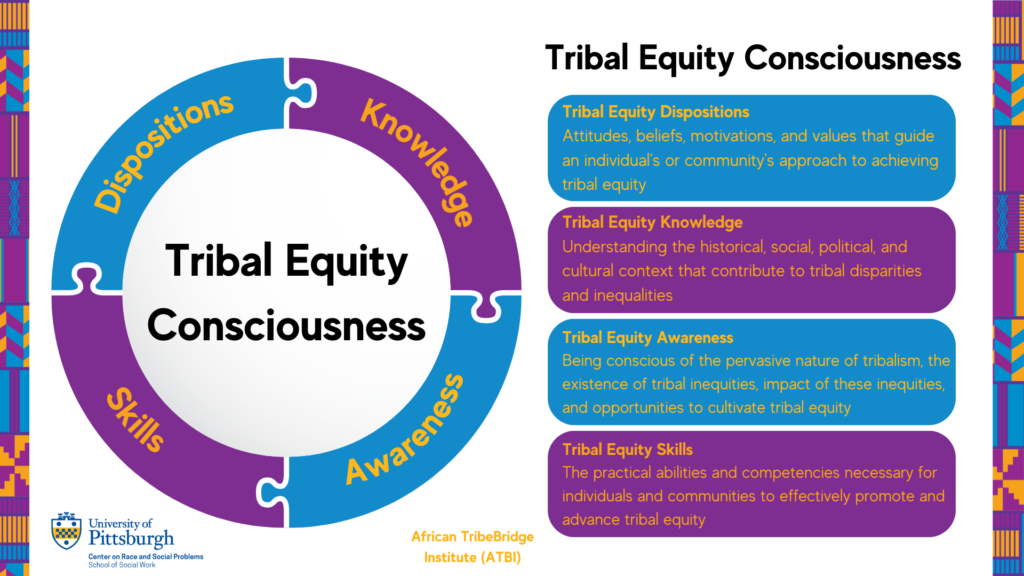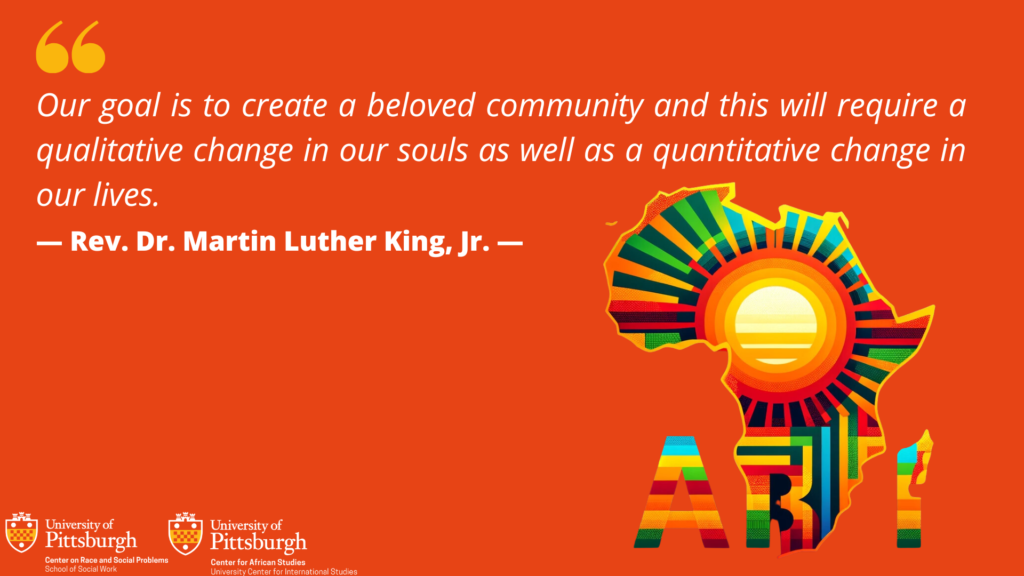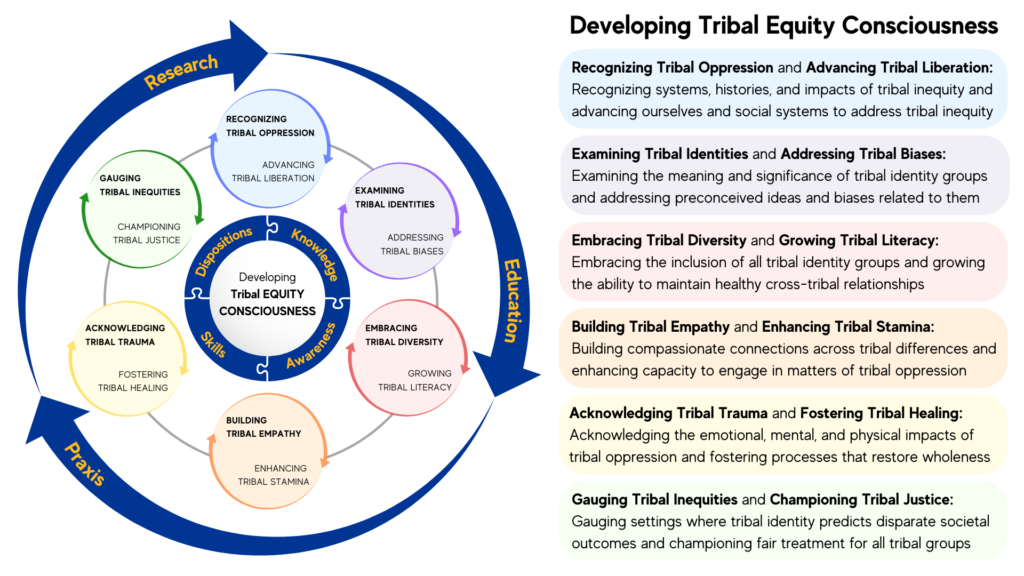African Tribe Bridge Institute (ATBI)
Connecting and Bridging Gaps between Tribes: Instituting A Structured Cognitive Behavioral Training Framework To Develop Grounded Personal and Collective Tribal Equity Consciousness
The nuances of tribalism in Ghana, much like the complexities of racism, cannot be distilled to overt acts of ethnic prejudice alone. The phenomenon is deeply woven into the societal fabric, influencing and being reinforced by the structures and systems in place. A comprehensive approach to mitigating tribalism requires an acknowledgment of its multifaceted nature — understanding its historical underpinnings, its varied manifestations, and the profound effects it has on communities.
Employing interdisciplinary methods drawn from education, neuroscience, psychology, social work, and sociology, we seek not only to understand tribalism but to actively dismantle its pervasive influence. This endeavor necessitates a concerted and ongoing commitment from both individuals and collectives to engage in learning and personal transformation.
The journey toward tribal equity in Africa is underpinned by the need for patience and trust in the transformative process. It requires faith that the cumulative efforts of raising awareness, fostering dialogue, and implementing educational interventions will gradually permeate societal consciousness and bring about systemic change. The impacts of such a transformation may not be immediately observable, but the pursuit is essential for the long-term cohesion and prosperity of nations.
Although tribalism is acknowledged as a significant social and political issue that can affect the stability of nations and the functioning of democracies in Africa, there appears to be no widely recognized declaration of tribalism as a public health crisis in Africa by any major health organization or government body. Even when tribalism has been linked to violence, such as the post-election violence in Kenya in 2007-2008Links to an external site., and is considered a challenge to democratic advancement in the continent.
It is important to highlight the difference between tribalism and ethnicity since these two terms are interchangeably used. Ethnicity refers to a group of people bonded by common cultural, ancestral, or linguistic traits, like the Akan or Ewe groups in Ghana, for example.
Tribalism, while connected to ethnicity, implies a stronger allegiance to one’s own tribe, often prioritizing its interests above those of others, which can lead to favoritism and potential conflict.
In brief, Ethnicity is about shared cultural traits, while tribalism highlights a prioritization and sometimes favoritism towards one’s own ethnic group, often in social and political contexts.
Having these two differences in mind, it is clear that tribalism is the issue we are trying to help address through educating and creating awareness. Historical narratives recount how African societies, rich in their distinct cultures and governance systems, coexisted harmoniously; that’s the utopia we seek once again.
Systemic problems, systemic solutions
“There must exist a paradigm, a practical model for social change that includes an understanding of ways to transform consciousness that are linked to efforts to transform structures.”
— Bell Hooks —
Although tribalism has not been declared a public health crisis by government bodies and agencies across the continent, it has been necessary to create steps toward addressing the impact of systemic tribalism on people and communities. Also, acknowledging tribalism’s existence is not enough to eradicate it. To bring about social and political transformation, individuals and communities committed to eradicating systemic tribalism need to develop an expansive understanding of the complex ways tribalism operates and use that understanding to formulate systemic strategies to foster tribal equity.
In other words, tribal equity is about more than merely creating a so-called ‘level playing field.’ It’s about realizing that historic and ongoing wrongs will only be righted when sustained attention is paid to the nature of those wrongs and to helping those most harmed by them. The work of uprooting tribalism must go beyond reacting with linear, performative, passive, and/or siloed approaches to particular instances or manifestations of tribalism. Rather, it requires the challenging, strategic work of socializing and institutionalizing antitribalism approaches to cultivating tribal equity.
Antitribalism can be defined as the ideology and practice of opposing or combating tribalism, which is the state of being organized by or advocating for tribes or tribal lifestyles. In the context of socio-political dynamics, antitribalism works against the discrimination, biases, and divisiveness that tribalism can engender within and between communities.
More specifically, antitribalism:
- Seeks to dismantle systemic and institutional structures that perpetuate tribal favoritism and divisions
- Promotes the recognition and celebration of individual and cultural differences while advocating for equal rights and opportunities regardless of tribal affiliation
- Encourages the development of a collective identity that transcends tribal lines, fostering a sense of national or global unity.
- Involves educational efforts to raise awareness about the harmful effects of tribalism on social cohesion and development.
- Advocates for policies and practices that ensure equitable treatment of all groups and facilitate intertribal dialogue and collaboration.
Antitribalism is not just the absence of tribalism but an active stance and effort to promote inclusivity, understanding, and harmony among diverse tribal identities.
To be antitribalism is to connect and bridge gaps between tribes ourselves from the unconscious, passive perpetuation of tribalism by actively examining and changing our socialized assumptions, ideas, and behaviors regarding ethnicity and tribalism. It is to understand that ongoing, collective action is needed to foster fair opportunities and outcomes for communities that have suffered and continue to suffer generations of structural and systemic inequality. It is to develop and embody shared visions, narratives, and commitments toward realizing tribal justice in the charge for tribal equity.
This transformative effort begins with the personal development of our consciousness, our dispositions, knowledge, awareness, and skills toward tribal equity and must then emanate outward to foster collective consciousness. Like all social transformation, it begins, but cannot end, in the transformation of the individual soul.

Figure 1. Tribal equity consciousness consists of four interrelated components: racial equity dispositions, racial equity knowledge, racial equity awareness, and racial equity skills.
Consciously cultivating tribal equity

“Our goal is to create a beloved community, and this will require a qualitative change in our souls as well as a quantitative change in our lives.”
— Rev. Dr. Martin Luther King, Jr. —
In the rich tapestry of Africa, each tribe weaves its unique thread. Yet, it’s vital to remember that these threads together form the vibrant fabric of the continent. Tribalism, if allowed to dominate, can weaken this fabric, causing tears that may take generations to mend. Instead, by understanding and celebrating our differences while recognizing our shared dreams and aspirations, we can fortify this fabric and ensure it remains strong for future generations.
The work to eradicate tribalism is daunting but also a transformative healing opportunity for our communities. As we heed the calls toward heightened consciousness for tribal equity, we all must continue to actively interrogate how we will contribute to the realization of a welcoming and just society that works for everyone and that everyone, at some level, desires.
Structured cognitive behavioral training Links to an external site. (SCBT)—an instructional derivative of cognitive behavioral therapy—provides powerful, evidence-based Links to an external site. tool for addressing the unconscious, maladaptive biases and behaviors that perpetuate tribalism and for asserting Links to an external site. our visions, narratives, and commitments to tribal equity. The SCBT framework for tribal equity consciousness development employs exercises and resources that help people replace impulsive behaviors, in thought and action, with intentional behaviors to combat tribalism within ourselves and in our society. In this way, SCBT can empower people and communities to contemplate and cultivate tribal equity.
The SCBT framework also involves identifying and addressing systemic factors that contribute to tribal disparities, such as institutional policies and practices, and developing systemic practices and interventions toward tribal equity. This entails a “systems thinking” approach, which doesn’t just look at individual events or institutions but at the relationships among them.
Through this approach, we can understand how to take the transformation within ourselves and bring it into a world of structures and systems, transforming them in the process. Thus, every person committed to antitribalsim becomes a source of positive change that emanates out into the world.
The first step, however, is to recognize the problem and to make a personal commitment to working for a more just society. This requires a willingness to confront personal biases and assumptions and to pursue ongoing learning, growth, and action.
The SCBT framework for tribal equity consciousness development is a methodological process that focuses on the exploration and embodiment of six bilateral and interconnected spheres of tribal equity consciousness development behaviors and strategies. These spheres are designed to empower individuals and communities to contemplate and cultivate tribal equity through research, education, and praxis. The concentric nature of the process recognizes that people and communities will continually refine their understanding, skills, and actions as they engage with each sphere.

Figure 2 – Critical systems thinking mental model of the SCBT framework for tribal equity consciousness development consisting of six interconnected, bilateral spheres of embodiment—reciprocal consciousness development behaviors stimulated through research, education, and praxis cycles.
The African TribeBridge Institute guides learners and teachers through the SCBT framework for tribal equity consciousness development and its systems thinking mental models via immersive resource modules that integrate narrative guides, videos, activities, articles, reflection prompts, discussion forums, and more—to support learners & teachers in analyzing the complexity and pervasiveness of racism, and reflecting on behaviors they can embody, personally and collectively, to catalyze anti-tribal initiatives, communities, and cultures. The expansive platform is supported by community contributions Links to an external site. to the learning and teaching resource base.
Through the resource platform, learners and teachers can explore and engage the tribal equity consciousness framework and its spheres of embodiment in efforts to enhance capabilities and motivations to consider, seek, and employ different perspectives across ethnic differences; elevate cultural humility, competence, and agency, empowering visions, narratives, and commitments towards advancing tribally equitable and inclusive communities; and ultimately, grow confidence and mindsets to be innovative and action-oriented agents for transformative social change.
By consciously, consistently, and collectively learning about and transforming ourselves, we can advance the restructuring of our society in a way that aligns our values with our reality to achieve a beloved community where all can thrive.
Platform for Resource Modules and Learning: Advancing Tribal Equity Consciousness through Structured Cognitive Behavioral Training in Africa
This platform for “Understanding Tribalism in Africa to Advance Structured Cognitive Behavioral Training to Develop Tribal Equity Consciousness” is poised to create a groundbreaking educational platform dedicated to tackling the nuanced and complex issue of tribalism in African contexts. This platform, central to the training’s mission, will serve as an innovative hub for resource modules and learning, blending academic rigor with practical applications and some level of entertainment.
Core Components of the Platform:
- Structured Cognitive Behavioral Training (SCBT) Modules: The heart of the platform will be its SCBT modules. These will offer structured, interactive learning experiences that guide users through understanding the psychological and sociocultural dynamics of tribalism. The modules will be infused with narrative guides, activities, articles, reflection prompts, discussion forums, case studies, real-life scenarios, and evidence-based strategies to confront and mitigate tribal biases.
- Multimedia Educational Content: The platform will feature a diverse range of multimedia resources, including video lectures from experts, documentary clips, podcasts, and infographics. These resources will provide users with varied perspectives on tribalism and its impact on African societies.
- Interactive Learning Tools: To enhance engagement, the platform will incorporate interactive elements like quizzes, simulations, and discussion prompts. These tools aim to encourage deep reflection and active application of learned concepts.
- Discussion Forums and Community Engagement: A key feature will be forums for discourse and collaboration. These spaces will enable learners to share insights, pose questions, and engage in meaningful discussions with peers and experts, fostering a vibrant learning community.
Implementation Approach:
- Content Development and Curation: Collaborate with subject matter experts in African studies, psychology, sociology, and anthropology to create and curate high-quality, culturally relevant content.
- User-Centric Design: Employ a user-centric approach in designing the platform to ensure ease of navigation, accessibility, and a supportive learning environment.
- Feedback and Adaptation: Incorporate mechanisms for user feedback to continuously adapt and update the platform, ensuring its relevance and effectiveness.
Anticipated Outcomes:
- Increased Awareness and Understanding: Users will gain a comprehensive understanding of tribalism’s roots, manifestations, and impacts in African contexts, fostering an informed perspective on tribal equity issues.
- Behavioral Change: Through SCBT techniques, the platform aims to facilitate a shift in attitudes and behaviors, promoting more inclusive and equitable mindsets among users.
- Empowerment for Action: Equipping users with knowledge and tools, the platform will empower them to become advocates for tribal equity in their communities and professional spheres.
- Building a Knowledge Community: Establish a dynamic and interactive community of learners, educators, and practitioners committed to addressing tribalism and promoting equity
Resource Modules
Let’s Understand the History of Africa (Great Ancient Africa)
This delves into Africa’s origins, showcasing the diverse cultures, boundaries, and languages that flourished long before the onset of colonial expeditions.
History of Great Ancient Africa
Imagine Africa Beyond Tribes! How Colonialists Created Tribalism That Africans Now Seek To Destroy
Module #1 – Tribal Equity Consciousness: An Overview
This foundational module sets the backdrop for consciousness development toward tribal equity and covers the following:
- Understanding the systemic impacts and evolution of ethnicities and tribalism.
- Reflecting on confidence and mindsets towards tribal equity and justice.
- Detailing the theory and practice of tribal equity consciousness.
- Engaging the SCBT framework for tribal equity consciousness development.
Access Tribal Equity Consciousness: An Overview module
Module #2 – Recognizing Tribal Oppression and Advancing Tribal Liberation
This module emphasizes the importance of recognizing the systems, histories, and impacts of tribal power, privilege, and inequality and advancing the critical transformation of ourselves and our social systems to address patterns of tribal inequality. Key aspects of this sphere include:
- Researching historical and contemporary manifestations of tribal oppression
- Analyzing the ways in which tribal inequalities are perpetuated through social, political, and economic systems
- Identifying strategies for transforming ourselves and our social systems and addressing patterns of tribal inequality
- Engaging in praxis (practice) by applying knowledge to advance tribal liberation in various contexts
Access Recognizing Tribal Oppression | Advancing Racial Liberation module
Module #3 – Examining Tribal Identities | Addressing Tribal Biases
This module involves a deep examination of the meaning and significance of our ethnic identity groups and addressing preconceived ideas and biases related to them. Key aspects of this sphere include:
- Reflecting on one’s own ethnic identity and the ways it shapes experiences and perspectives
- Acknowledging and challenging stereotypes and biases that reinforce tribalism
- Engaging in education and dialogue to better understand the experiences and perspectives of different ethnic identity groups
- Practicing self-awareness and ongoing reflection to address biases and work towards greater tribal equity
Examining Tribal Identities | Addressing Tribal Biases module
Module #4 – Embracing Tribal Diversity | Growing Tribal Literacy
This module focuses on embracing the inclusion of all ethnic identity groups and growing the ability to maintain healthy cross-ethnic relationships, analyze tribal dynamics, and confront tribal oppression. Key aspects of this sphere include:
- Developing cultural competence and understanding the value of diverse perspectives
- Practicing active listening and empathy in cross-ethnic relationships
- Engaging in ongoing education to deepen understanding of tribal dynamics and the ways in which they play out in various contexts
- Challenging and confronting tribal oppression when it arises, both on an individual and systemic level
Embracing Tribal Diversity | Growing Tribal Literacy module
Module #5 – Building Tribal Empathy | Enhancing Tribal Stamina
This module aims to build compassionate connections across tribal differences and enhance the capacity to engage matters of tribal difference and oppression openly and constructively. Key aspects of this sphere include:
- Developing empathy for the experiences and perspectives of individuals from different ethnic identity groups
- Cultivating the emotional resilience and stamina required to engage in difficult conversations about tribes and tribalism
- Encouraging open and honest dialogue about tribes and tribalism oppression
- Practicing self-care and seeking support as needed to maintain emotional well-being in the face of challenging tribal dynamics
Building Tribal Empathy | Enhancing Tribal Stamina module
Module #6 – Acknowledging Tribal Trauma | Fostering Tribal Healing
This module acknowledges the emotional, mental, and physical impacts of tribal oppression while fostering processes that restore wholeness, repair damage, and transform societal structures to affirm the inherent value of all people. Key aspects of this sphere include:
- Recognizing the signs and symptoms of tribal trauma in oneself and others
- Supporting individuals and communities in their healing journeys
- Engaging in restorative practices that repair harm and promote reconciliation
- Advocating for transformative change in societal structures to prevent future tribal trauma
Acknowledging Tribal Trauma | Fostering Tribal Healing module
Module #7 – Gauging Tribal Inequities | Championing Tribal Justice
This module involves gauging settings where tribal group identity predicts disparate societal outcomes, identifying root causes and systemic interventions, and championing fair treatment and equitable opportunities and outcomes for all ethnic identity groups. Key aspects of this sphere include:
- Assessing and analyzing the extent of tribal inequities in various contexts, such as education, healthcare, criminal justice, and employment
- Identifying the root causes of these disparities, including systemic tribalism, implicit bias, and historical injustices
- Developing and implementing interventions to address these root causes and promote tribal equity
- Advocating for policy changes, resource allocation, and community mobilization to champion tribal justice
Access Gauging Tribal Inequities | Championing Tribal Justice module
